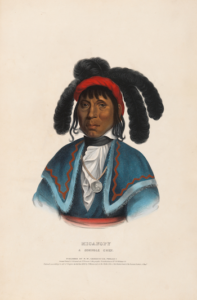
Micanopy
*Micanopy's birth is celebrated on this date in c. 1780. He was an ally of African slaves and the leading chief of the Seminoles during the Second Seminole War. His name was derived from the Hitchiti terms Miko (chief) and naba (above), meaning "high chief" or the like.
Micanopy was born near present-day St. Augustine, Florida, sometime around 1780. He succeeded Bolek as hereditary principal chief of the Seminole in 1819. The people had a matrilineal kinship system: property and position were passed through the maternal line. Nearly 40, when he became chief, Micanopy soon began acquiring large amounts of land and cattle. As was common practice among elite Seminoles, he hired over 100 fugitive slaves to work his estates during the early nineteenth century. He encouraged intermarriage between the Seminole and Blacks. This had been the Seminole tradition; they considered Blacks to be human equals, unlike the view of whites. Some Black Seminole descendants gained influence as an elite among tribal councils (including several war chiefs).
Following the American purchase of Florida from Spain in 1819 through the Adams–Onís Treaty and the subsequent appointment of Andrew Jackson as territorial governor in 1821, large numbers of white-American settlers began colonizing northern Florida during the next decade. Micanopy opposed further American settlement of the region. As conflicts arose more frequently between the Seminole and settlers, the Seminole drove away from the Florida coast and into the extensive wetlands of the interior. By the Treaty of Moultrie Creek in 1823, whites seized 24 million acres of Seminole land in northern Florida. The Seminoles moved to the central and southern territories. Slaveholders from Florida and neighboring states demanded that the Seminole capture and return African slaves who had taken refuge with them. American development of large cotton plantations in Florida resulted in planters buying more slaves as workers, and some continued to escape the harsh regime.
The pressure continued against the tribe, and Americans pressed for removal following the passage of the Indian Removal Act in 1830. A group of Seminole chiefs eventually agreed to the Treaty of Payne's Landing on May 9, 1832; they ceded more Seminole lands in exchange for a reservation in the Indian Territory (present-day Oklahoma). While working to negotiate a peaceful resolution between the Seminole and local whites, Micanopy refused to sign the treaty. He joined younger chiefs opposing the treaty, such as Osceola, Alligator, and Wild Cat (his nephew). They began to organize resistance among the Seminole warriors. Whites repeatedly demanded US military action against the Seminole, and the Second Seminole War began.
The Seminole had early success, but the elderly Micanopy became convinced of the futility of war as he realized the large number of American soldiers who could be sent against the Seminole. He surrendered in June 1837 and began negotiating to move his tribe to the Indian Territory, but Osceola kidnapped him. In December 1838, Micanopy was captured by General Thomas S. Jesup's forces while under a flag of truce. This breach of honor by the US was considered an outrage by much of the public, increasing their sympathy toward the Seminole. Imprisoned at Charlestown, South Carolina, Micanopy was eventually released and sent with around 200 other Seminoles to Indian Territory.
They were initially put under Creek Nation authority, although the people had long been independent. Although Micanopy attempted to reestablish the Seminole as independent, he never regained his previous power. In 1845, he was one of the signatories of a treaty with the US, which gave the Seminole of western Florida semi-independence from the Creek Nation in Indian Territory. The treaty provided for complete Seminole independence to be granted in 1855. Micanopy died at Fort Gibson on January 2, 1849.